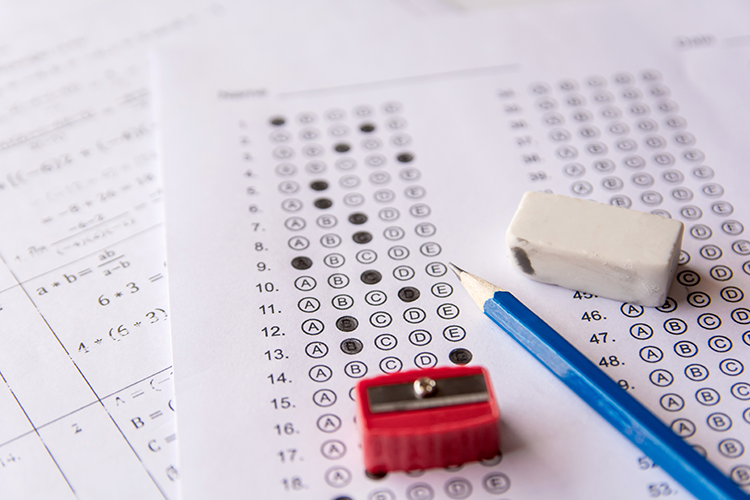Admissions test requirement for ABA-accredited law schools will remain in place for now

Image from Shutterstock.
A proposed revision to a law school accreditation standard that removes an entrance exam requirement was rejected Monday by the ABA House of Delegates, at the organization’s midyear meeting in New Orleans.
Resolution 300 was brought by the ABA’s Section of Legal Education and Admissions to the Bar and called for cutting the test requirement in Standard 503. A similar measure, which suggested cutting the standard all together, was brought by the section in August 2018, but withdrawn shortly before the House gathered.
“The Council is disappointed in the House of Delegates’ vote on Resolution 300. It will consider next steps at the Council meeting on Feb. 17, consistent with ABA rules and procedures,” Bill Adams, managing director of ABA Accreditation and Legal Education, said in a statement.
Under ABA rules, proposed revisions to the accreditation standards and rules are sent to the House for concurrence up to two times, but the council has the final decision on matters related to law school education.
Many spoke in favor and against the resolution, but for the most part, all agreed on one thing—their position would help diversity in legal education.
While law schools can now use the GRE as an entrance exam, many still use the LSAT. Joseph West, chair of the council of the ABA Section of Legal Education and Admissions to the Bar, noted that the LSAT has been used for some time, yet diversity in the profession remains abysmal.
“The council is not eliminating or prohibiting the admissions test; it can’t do so. It’s simply allowing each law school to decide if it wants to use it. I will note that nearly all medical schools require an admissions test, even though it is not required,” said West, a partner and the chief diversity officer at Duane Morris.
Craig Boise, dean of Syracuse University College of Law, told the House that admissions tests don’t predict law student success as much as many think. He also is a member of the Legal Ed council.
“I do want this kind of flexibility as a law school dean,” he said.
Angela Winfield, the Law School Admission Council’s vice president and chief diversity officer, spoke against the resolution. Citing LSAC data, she said that for Black law school applicants who had undergraduate GPAs between 3.0 and 3.24 and did not submit LSAT scores, the group had a 15% acceptance rate. White applicants in the same category had a 35% acceptance rate.
For Black and white law school applicants with that GPA range with LSAT scores in the 145 to 149 range, the acceptance rate was 52%, according to Winfield.
Paulette Brown, a former ABA president, spoke against the resolution as well. Now retired, she spent much of her work as a lawyer in private practice doing diversity and inclusion work.
She was initially unsure about what she thought of the resolution.
“When I hear the word ‘flexibility,’ the hair goes up on my neck. When you talk about flexibility that means subjectivity. When you introduce subjectivity into any process, it provides too much opportunity for mischief,” said Brown, adding that subjectivity is how “unconscious bias creeps in.”
Follow along with the ABA Journal’s coverage of the 2023 ABA Midyear Meeting here.
Additionally, during notice and comment for the proposed revision, more than 55 deans of ABA-accredited law schools sent a letter to the council, arguing that removing a law school admissions test could increase school’s reliance on grade point averages and “other criteria that are potentially more infused with bias.”
Discourse around Standard 503 has been plentiful. Initially, it required all ABA-accredited law schools to use the Law School Admission Council’s Law School Admission Test. In 2016, the University of Arizona James E. Rogers College of Law received a variance to accept the Graduate Record Examination, in addition to the LSAT.
A handful of other schools followed suit, and the council of Legal Ed in 2018 brought a resolution to cut Standard 503. It was met with opposition from the Young Lawyers Division and the Minority Network, a group of law school admissions professionals, and was withdrawn shortly before the House vote was scheduled.
Also, in 2021 the council in closed session voted to allow the GRE to be used as an entrance exam, in addition to the LSAT. That addressed an application of the standard, not a revision, and did not require concurrence from the House, according to Bill Adams, ABA managing director of accreditation and legal education.
Kellye Testy, president and chief executive officer of the LSAC, said they welcome the council having additional time to research what sort of impact eliminating law school admissions exams would have.
“We are committed to working with the ABA and the entire legal education community to reconsider these issues and find shared ways to continue to expand access and diversity,” she said.
The Educational Testing Service, which is responsible for the GRE, had similar thoughts.
“We are pleased with the outcome of the vote by the American Bar Association’s House of Delegates today against the revisions to Standards 501 and 503. With this, we look forward to continuing to support law schools in their effort to recruit, retain and educate the law students of tomorrow,” the organization wrote in a statement.
• Watch video of the debate on Res. 300.
Write a letter to the editor, share a story tip or update, or report an error.



